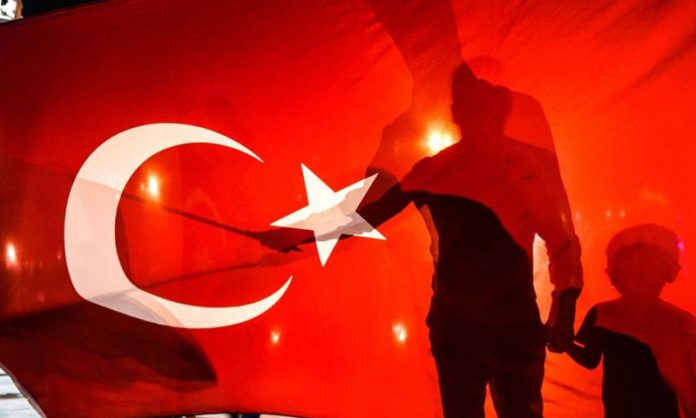With Operation Olive Branch continuing to successfully eradicate threats stemming from areas held by PKK-affiliated groups in northern Syria, Ankara reiterated its assurance on Syria’s territorial integrity and said it has no eye on other countries’ soil.
Speaking in Antalya Monday, Foreign Minister Mevlüt Çavuşoğlu stressed the areas targeted in the operation will be cleared of terrorists and handed over to the Syrian people like in Operation Euphrates Shield.
“We do not have any interest in the soil of Syria or Iraq. We launched the operation because of the increased number of terrorist attacks,” Çavuşoğlu said. The foreign minister highlighted that Turkey has always upheld the integrity of the two countries and seeks ways to normalize the lives of the people.
Ankara has long pointed to the necessity of clearing the country’s borders from the terrorist groups, as Turkey’s legitimate concerns over the U.S.’s arming of the Democratic Union Party (PYD), and its armed wing, the People’s Protection Units (YPG), which is inextricably linked to the PKK, have been ignored.
Çavuşoğlu stated that the YPG has been oppressing people in Syria and attempting to involve them in their acts to reach its objectives.
“Children are armed by force in Syria; people want to return to their homes but the PKK is preventing them from doing so,” he said, while calling on the international community not to remain silent to the violations of human rights.
Turkey launched Operation Olive Branch on Jan. 20 in Syria’s northwestern Afrin region to eliminate all terrorist groups in the area. While some countries criticized the operation claiming that it is a distraction from the fight against Daesh, Turkish officials reiterated that Turkey has all the right reasons to be in Afrin within the framework of self-defense as enshrined in Article 51 of the U.N. Charter.
By the ninth day of the operation, 44 targets have been destroyed in airstrikes by jets and 597 terrorists have been killed, the Turkish military said in a statement Monday.
According to the Turkish General Staff, the operation aims to establish security and stability along the Turkish borders and in the region as well as to protect Syrian people from the oppression and cruelty of the terrorists.
In an op-ed for The New York Times, Foreign Minister Çavuşoğlu criticized the U.S’s partnership with the PYD/YPG, saying that it has chosen the wrong partner in the fight against Daesh.
“An impasse has been created between us by the United States’s choice of local partner in this war: A group that the American government itself recognizes as a terrorist organization. The so-called People’s Protection Units, or YPG, is simply the outlawed Kurdistan Workers’ Party [PKK] terrorist organization by another name,” he wrote and underlined that the U.S’s partnership with the PYD “is a fundamental breach of everything that NATO stands for.”
As Turkey had to act in the face of growing security threats and launched the Afrin operation, the minister said the Turkish Armed Forces (TSK) is acting with the utmost precaution to avoid harming civilians. Turkish NGOs have also accelerated efforts to set up camps to host civilians fleeing the Afrin region.
Deputy Prime Minister Bekir Bozdağ said Monday that it is irrational to expect Turkey to overlook the attempt to build a terror state on its border, reiterating the ongoing operation in Afrin was not against Kurds but against terrorist groups.
Speaking at the Jerusalem Meeting in Istanbul, Bozdağ, who is also the government’s spokesman, said the goal of the Afrin operation is to eliminate the YPG terrorist group from the region as well as to ensure safety and security for civilians, including Turkmen, Arabs, Kurds and other ethnic groups living there.
The deputy prime minister said Turkey has always supported Kurds in Iraq and Syria when they faced oppression.
Bozdağ added the operation was being carried out with respect for the state of Syria, its territorial integrity, sovereignty and political unity, and would continue in this vein.
“Turkey will withdraw from the region after the operation reaches success,” he said, highlighting that the Afrin operation was not a “choice” but a necessity.
After days of poor weather conditions, Turkish special forces units and Free Syrian Army (FSA) fighters, backed by Turkish air and ground forces, launched an assault on heavily-fortified YPG terrorists in northern Syria’s strategic Mount Barsaya, liberating the position on Sunday afternoon.
The mountain overlooks the plain and the shortest route between the towns of FSA-held Azaz and YPG-held Afrin. Its location also allows YPG terrorists to target civilians on the Turkish border province of Kilis and the Syrian town of Azaz through mortar, artillery and rocket strikes.
Gen. Joseph Votel, in the meantime, the commander of the U.S. Central Command, said Monday that the U.S. will not withdraw troops from the YPG-held town of Manbij, as Turkey seeks to expand Operation Olive Branch to clear terrorists off of its borders.
Votel reportedly said that withdrawing forces from PKK-linked YPG-held Manbij is “not something the U.S. is looking into,” CNN reported.
Turkish officials have consistently noted that Operation Olive Branch will continue into Manbij and have criticized the U.S. for not keeping its promises that local councils would run the cities after they were liberated, although the PYD has taken over control in northern Syria.
Previously, the U.S. administration, under former President Barack Obama, promised Turkey that the YPG terrorists would move east of the Euphrates River. However, despite warnings from Ankara, the promises were not kept.
The YPG’s ultimate aim is to establish an autonomous region in northern Syria by connecting the northwestern Afrin canton to the Kobani and Jazeera cantons in the northeast. As such, Turkey’s operation will put a stop to the “terror corridor,” as Ankara calls it.
As a result of the broken promises by the U.S., Turkey also shifted its position and vowed to clear all terrorists from northern Syria, including Manbij and the eastern parts of the Euphrates.





